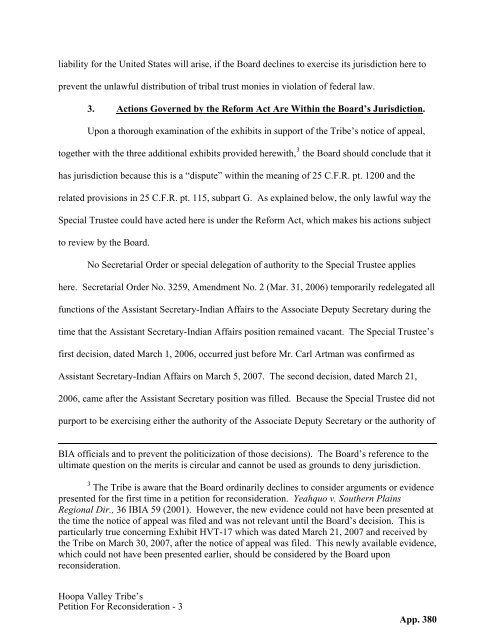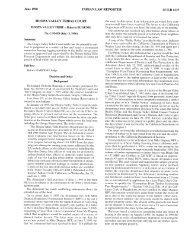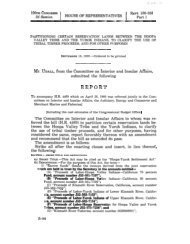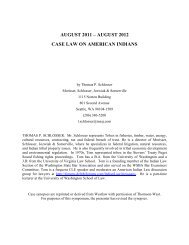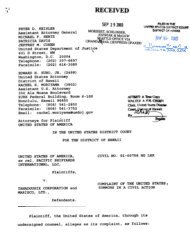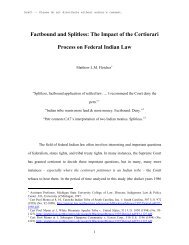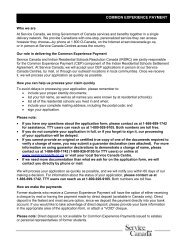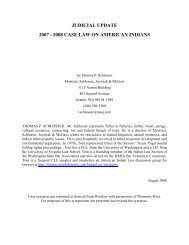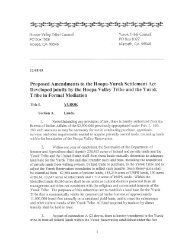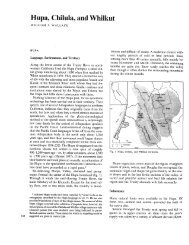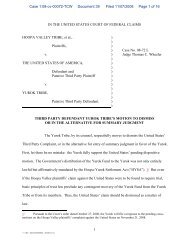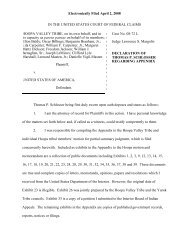Hoopa appendix supporting summary judgment - Schlosser Law Files
Hoopa appendix supporting summary judgment - Schlosser Law Files
Hoopa appendix supporting summary judgment - Schlosser Law Files
Create successful ePaper yourself
Turn your PDF publications into a flip-book with our unique Google optimized e-Paper software.
liability for the United States will arise, if the Board declines to exercise its jurisdiction here to<br />
prevent the unlawful distribution of tribal trust monies in violation of federal law.<br />
3. Actions Governed by the Reform Act Are Within the Board’s Jurisdiction.<br />
Upon a thorough examination of the exhibits in support of the Tribe’s notice of appeal,<br />
together with the three additional exhibits provided herewith, 3 the Board should conclude that it<br />
has jurisdiction because this is a “dispute” within the meaning of 25 C.F.R. pt. 1200 and the<br />
related provisions in 25 C.F.R. pt. 115, subpart G. As explained below, the only lawful way the<br />
Special Trustee could have acted here is under the Reform Act, which makes his actions subject<br />
to review by the Board.<br />
No Secretarial Order or special delegation of authority to the Special Trustee applies<br />
here. Secretarial Order No. 3259, Amendment No. 2 (Mar. 31, 2006) temporarily redelegated all<br />
functions of the Assistant Secretary-Indian Affairs to the Associate Deputy Secretary during the<br />
time that the Assistant Secretary-Indian Affairs position remained vacant. The Special Trustee’s<br />
first decision, dated March 1, 2006, occurred just before Mr. Carl Artman was confirmed as<br />
Assistant Secretary-Indian Affairs on March 5, 2007. The second decision, dated March 21,<br />
2006, came after the Assistant Secretary position was filled. Because the Special Trustee did not<br />
purport to be exercising either the authority of the Associate Deputy Secretary or the authority of<br />
BIA officials and to prevent the politicization of those decisions). The Board’s reference to the<br />
ultimate question on the merits is circular and cannot be used as grounds to deny jurisdiction.<br />
3 The Tribe is aware that the Board ordinarily declines to consider arguments or evidence<br />
presented for the first time in a petition for reconsideration. Yeahquo v. Southern Plains<br />
Regional Dir., 36 IBIA 59 (2001). However, the new evidence could not have been presented at<br />
the time the notice of appeal was filed and was not relevant until the Board’s decision. This is<br />
particularly true concerning Exhibit HVT-17 which was dated March 21, 2007 and received by<br />
the Tribe on March 30, 2007, after the notice of appeal was filed. This newly available evidence,<br />
which could not have been presented earlier, should be considered by the Board upon<br />
reconsideration.<br />
<strong>Hoopa</strong> Valley Tribe’s<br />
Petition For Reconsideration - 3


